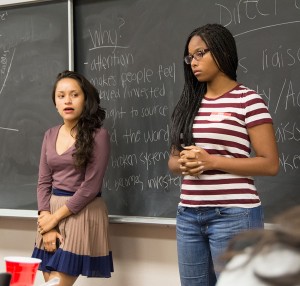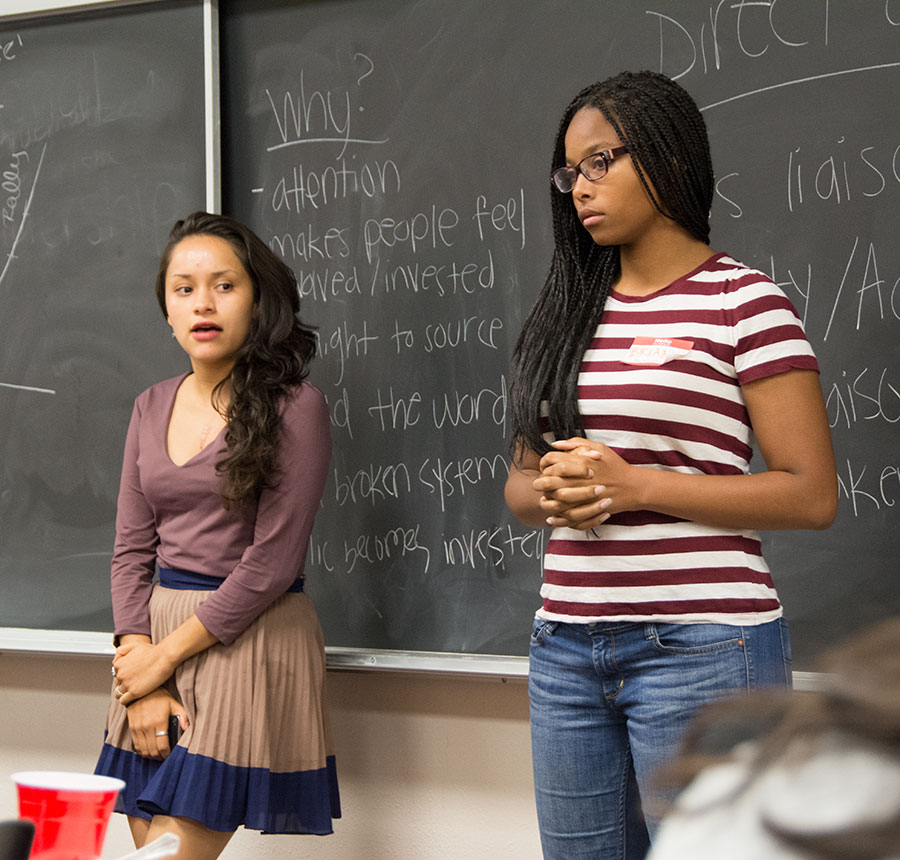SCALE hosts weekend conference for activists
On Sunday, the Student Coalition Against Labor Exploitation hosted the Trojans for sChange Conference, welcoming social justice-focused student organizations to learn about leadership and organizational strategies and discuss how to make change.

Speaking out · Maria Rodriguez, left, a junior majoring in NGOs and social change, and Brianna Thorpe, right, a sophomore majoring in business administration, speak at the Trojans for sChange Conference this weekend. – Mariya Dondonyan | Daily Trojan
“We’re hoping to get good conversation going about what it really takes to make change at this university because a lot of student groups face similar issues across the board when they bring up change to administration and try to get involved in activist causes,” said Sarah Newell, a member of SCALE’s leadership team.
Workshops included sessions on collective liberation, creative tactics and action direction, leadership development and making cultural change. University employees as well as the USC Chicano Student Movement of Aztlán and Queer People of Color also led discussions on the mission of and challenges faced by USC cultural assemblies.
More than 40 attendees representing 21 campus organizations — including Black Student Assembly, Women’s Student Assembly and the Diversity Affairs division of Undergraduate Student Government — as well as groups from Whittier College and Clergy & Laity United for Economic Justice attended the event. Newell said that both new organizations and those that have been established for longer periods of time could benefit from working together to address common issues.
“SCALE has been around for 15 years, but a lot we can do better, especially having a four-year turnaround period at a university,” Newell said. “But especially for newer groups, talking about leadership and how to get younger folks to understand everything you’ve learned — so not a huge learning curve — is helpful.”
Morgan Mamon, a member of SCALE, STAND and co-president of GlobeMed, said she attended the conference to learn about how she can implement local change, particularly in GlobeMed, which is primarily focused on providing foreign aid.
One way the conference addressed the issue of initiating local change was through a conversation in which university employees shared their experience working for the school. One of the employees, who wished to remain anonymous, spoke about the hardship of receiving only $12.80 per hour after working for the university for seven years. Despite holding a job, he remains homeless, unable to afford permanent housing with his current salary.
He said one of his favorite parts of his job is greeting students in the morning and when students recognize him and start a conversation. He said, however, that he feels the university stifles these relationships.
“I work hard, really damn hard,” the employee said. “But we’re told not to speak to students or to communicate with you guys. I guess you would call it corporate segregation. They don’t want you guys to know what we’re doing in the back or for us to know what you’re doing at school.”
The conversation brought awareness of local labor exploitation to students like Brianna Thorpe, a sophomore majoring in business administration. The group also discussed the disparity between USC’s $6 billion fundraising initiative and the amount that USC employees are paid.
“With SCALE I think of factories in Bangladesh, and we need to fight those, but when you hear about people in your own campus being exploited, I don’t know what to say,” Thorpe said.
Whether organizations in attendance were striving to make political or social change at the global or local level, many attendees agreed that it is necessary to come together and utilize the resources they have by working together. Rhea LaFleur, a sophomore majoring in sociology who is involved in WSA, says it will be a great resource to have the opportunity to collaborate with other social justice groups.
“We share a lot of the same beliefs, but don’t spend time communicating with one another,” LaFleur said. “The fact [that we’re] working together today will make our efforts a lot stronger.”

